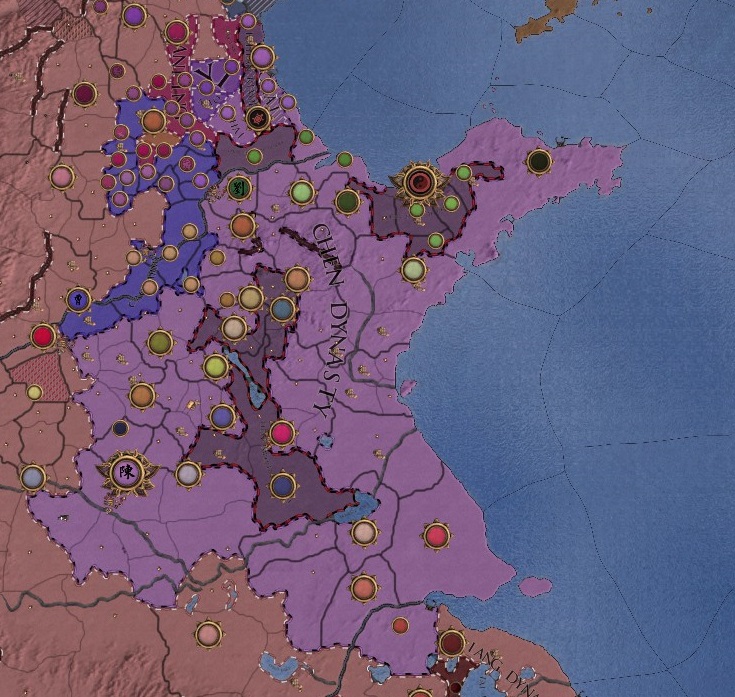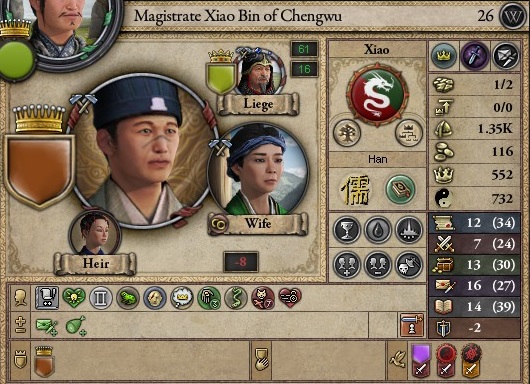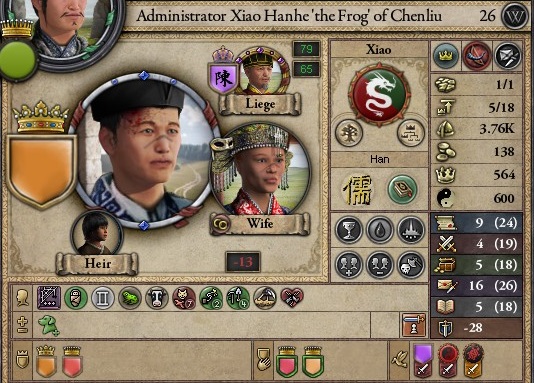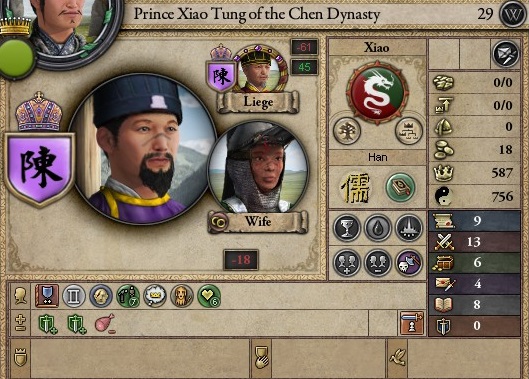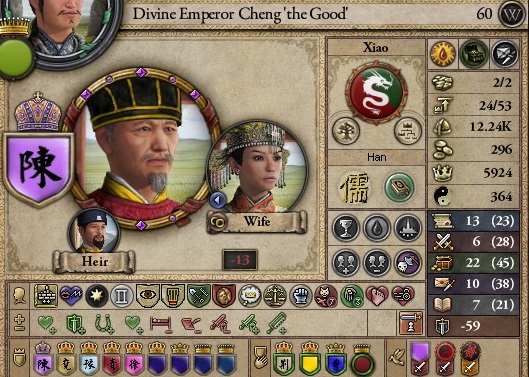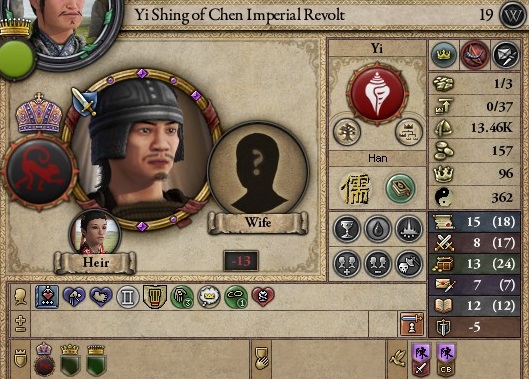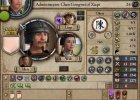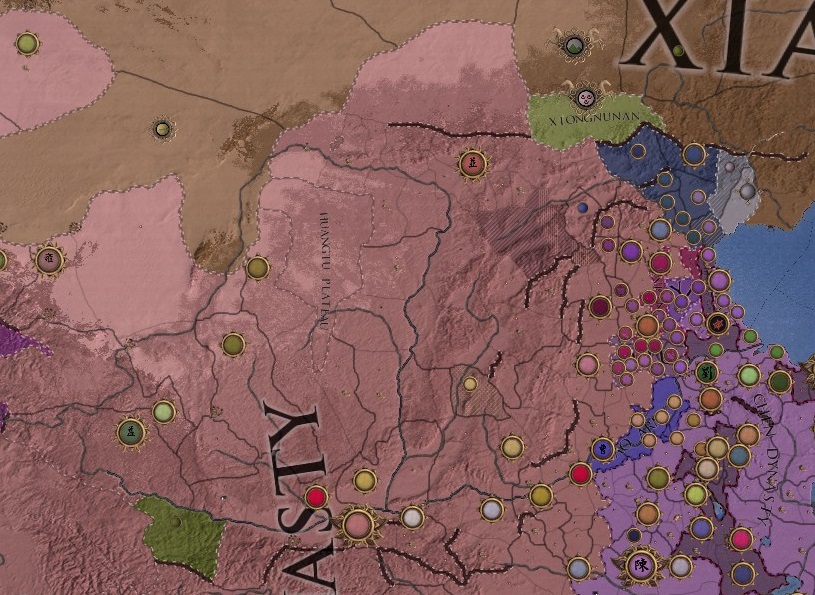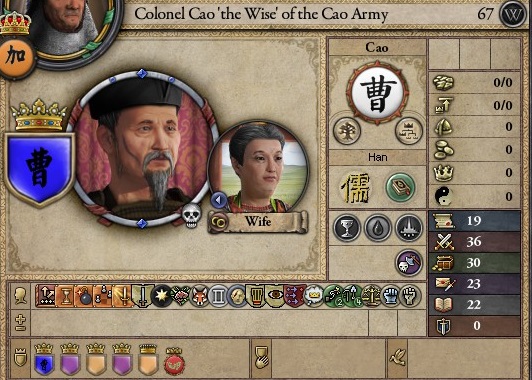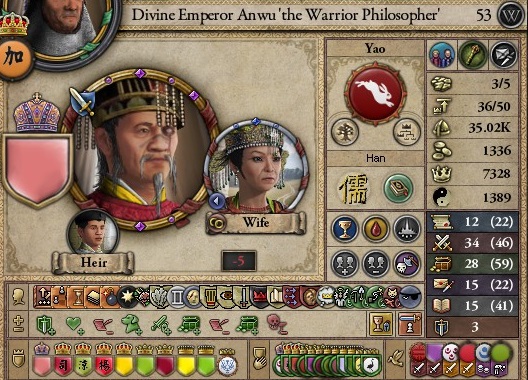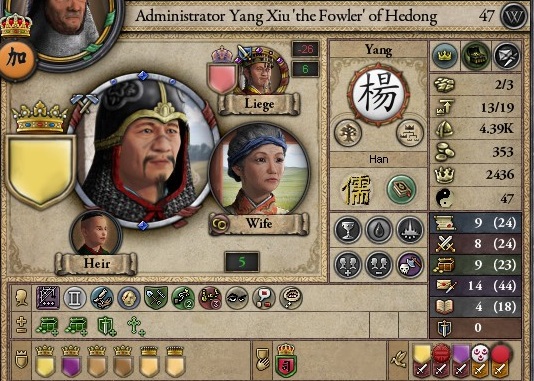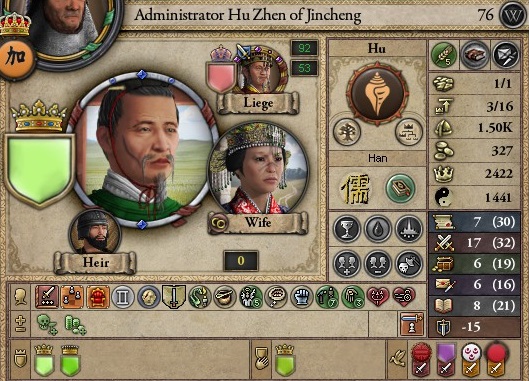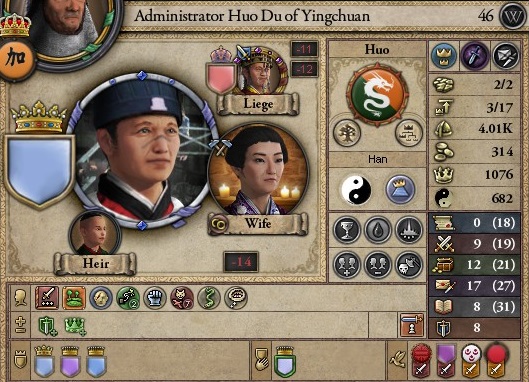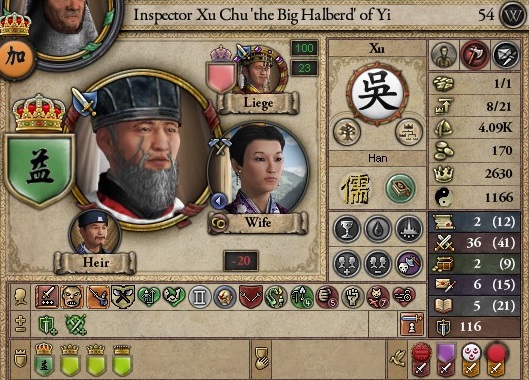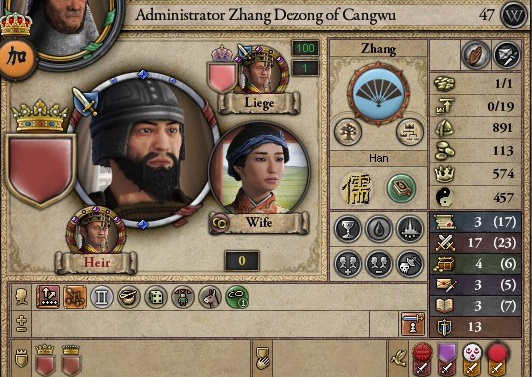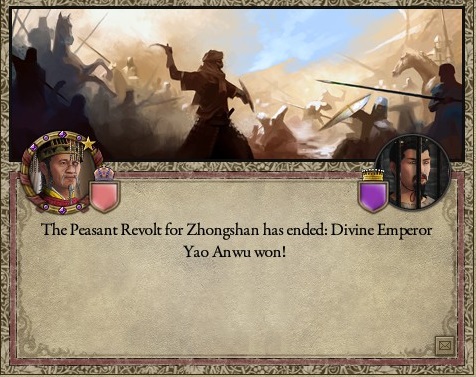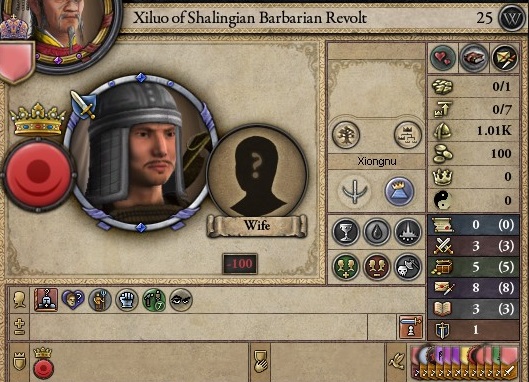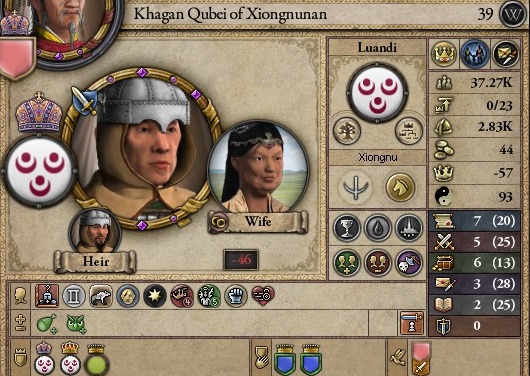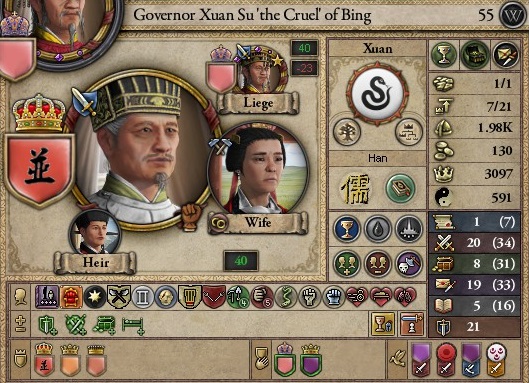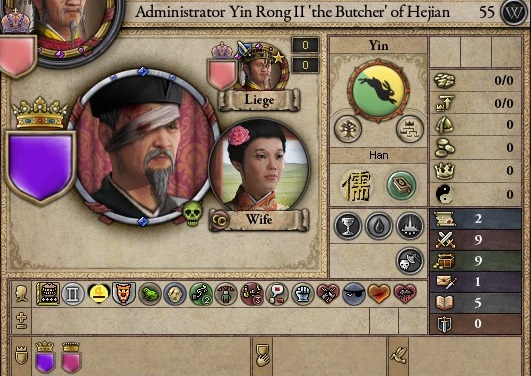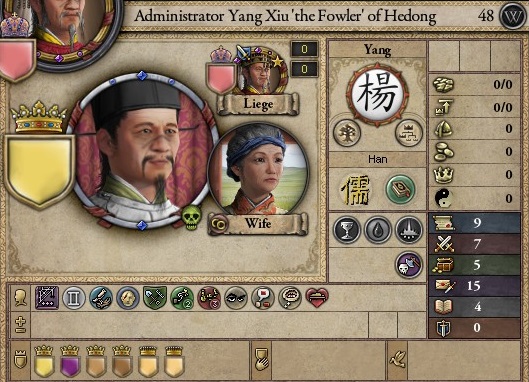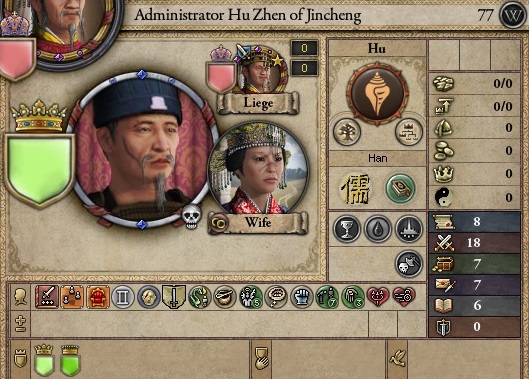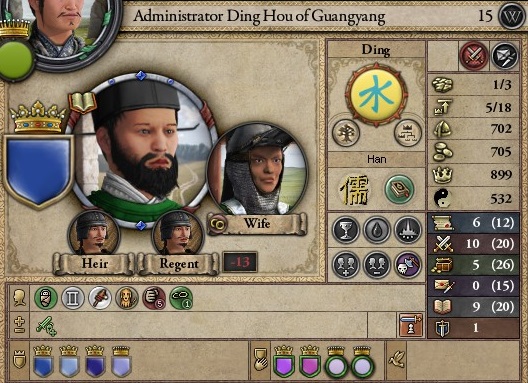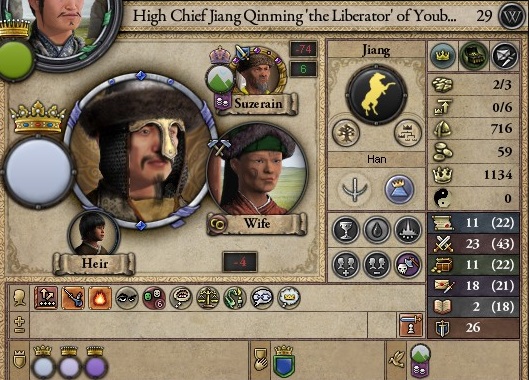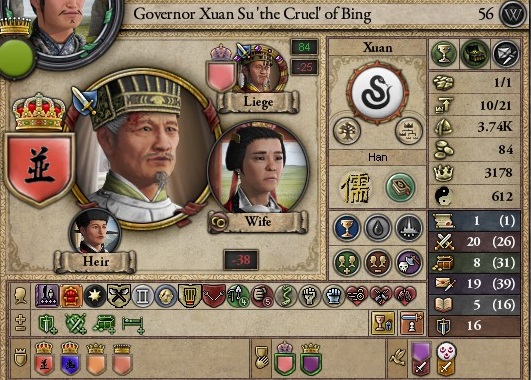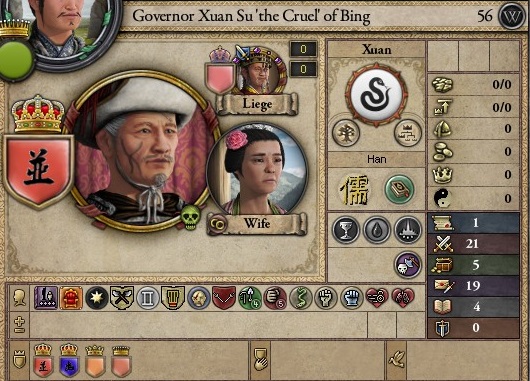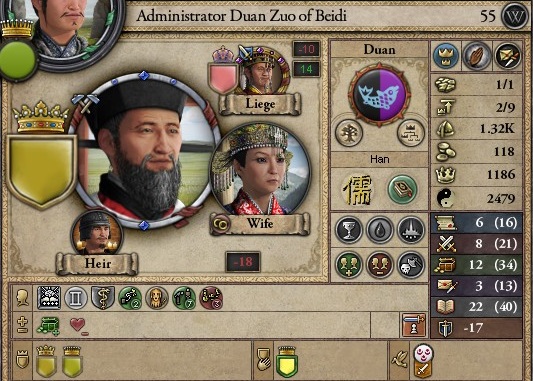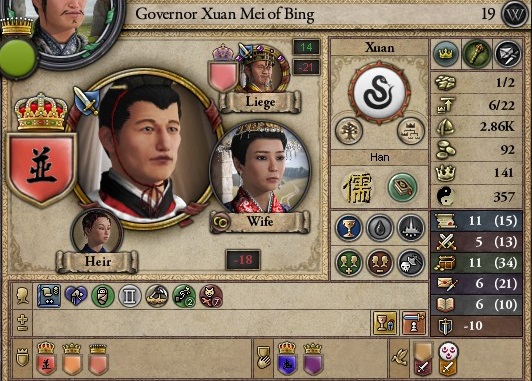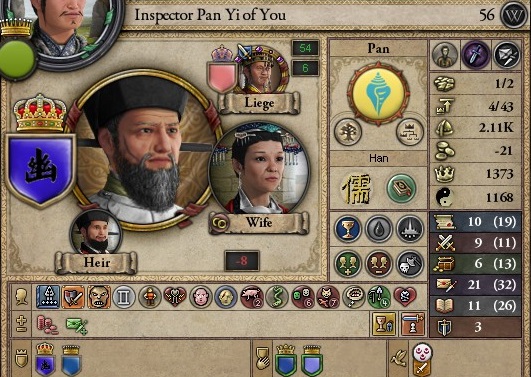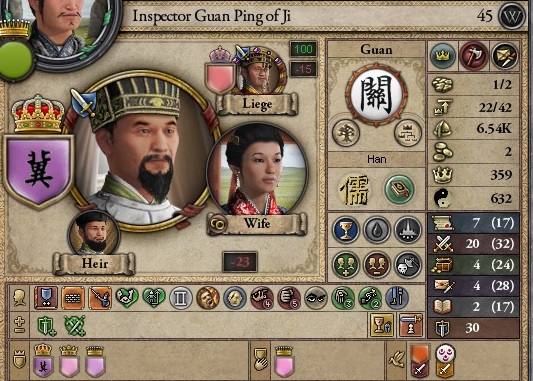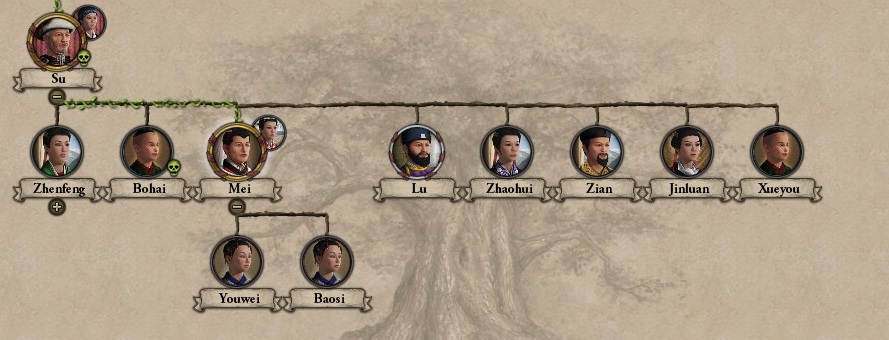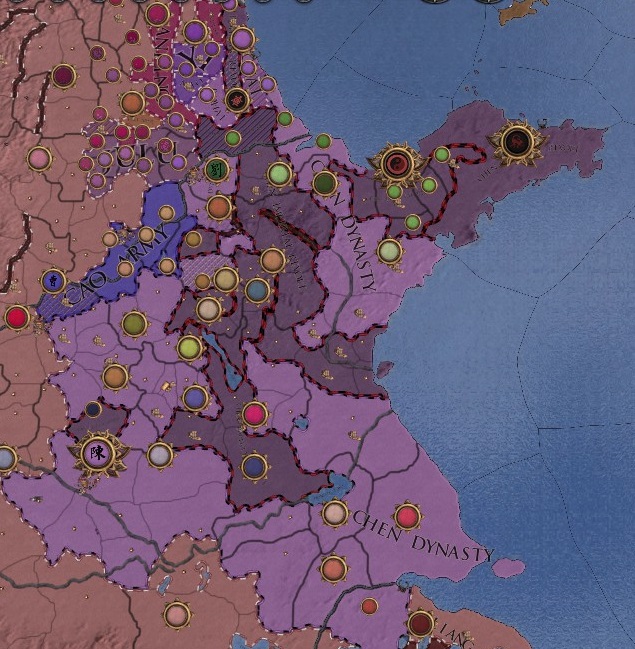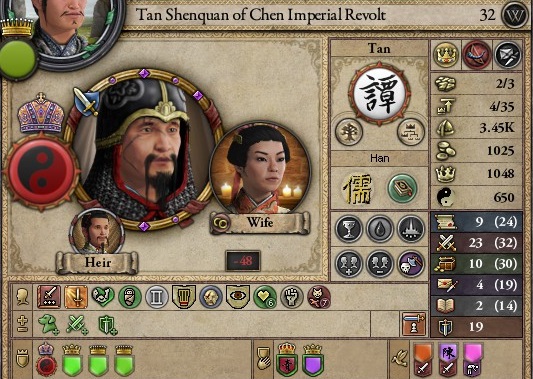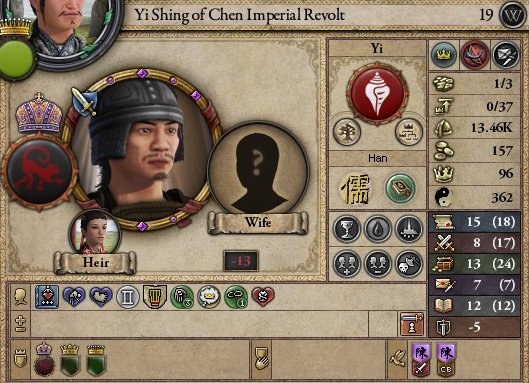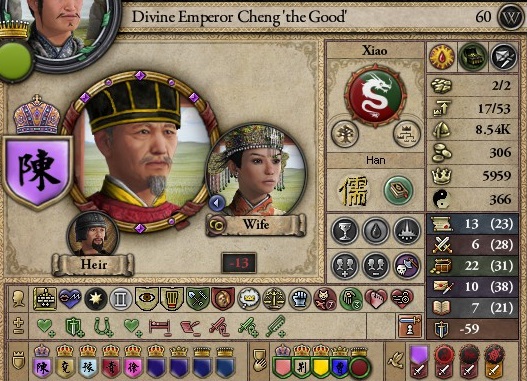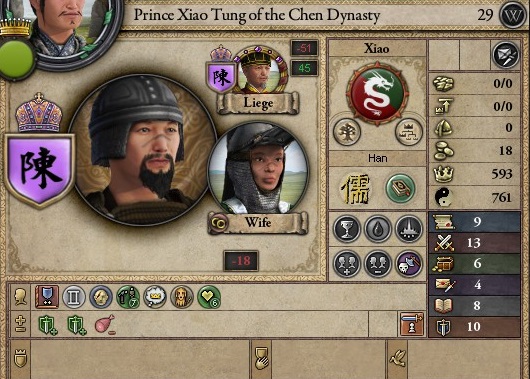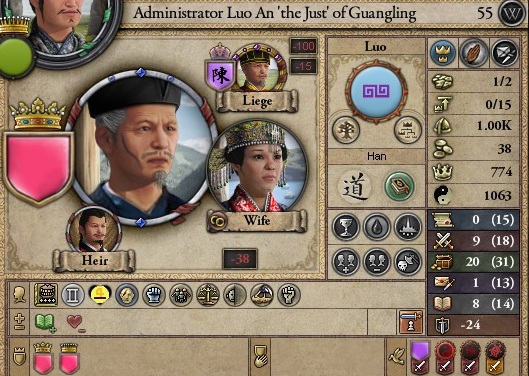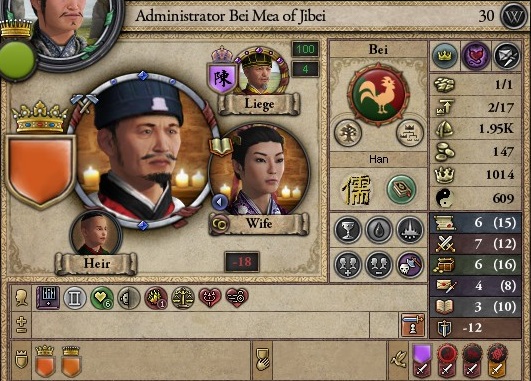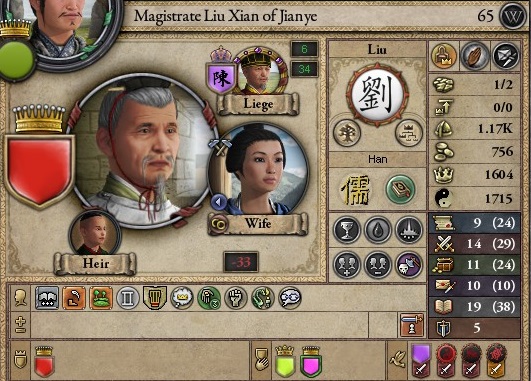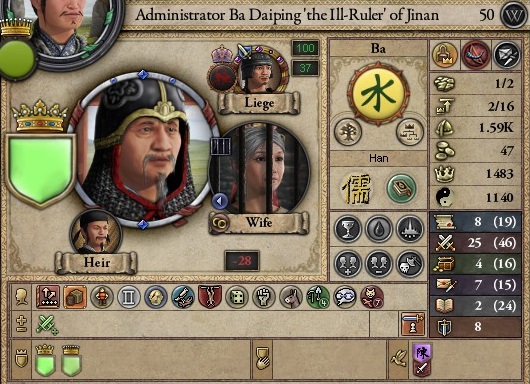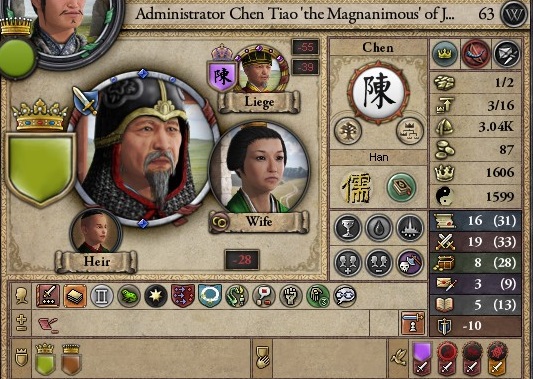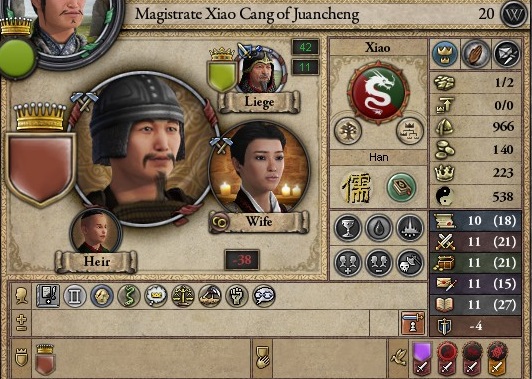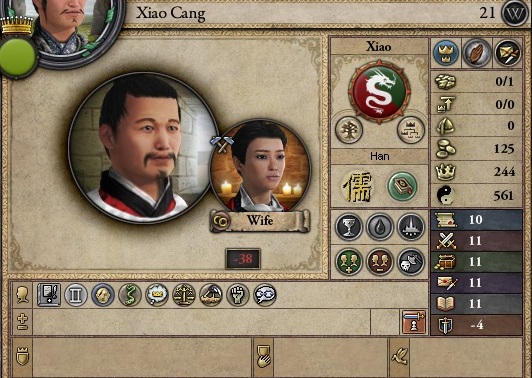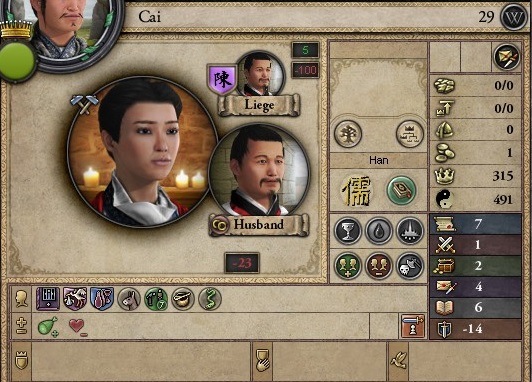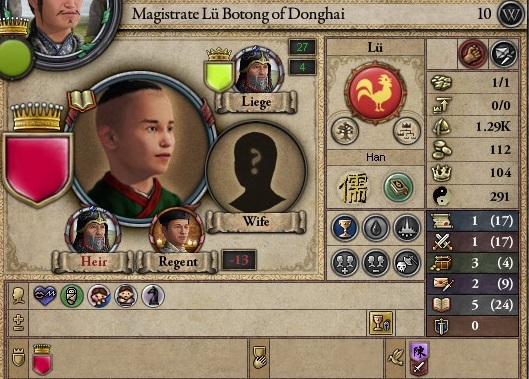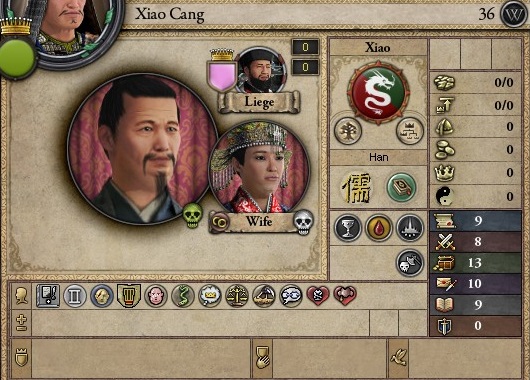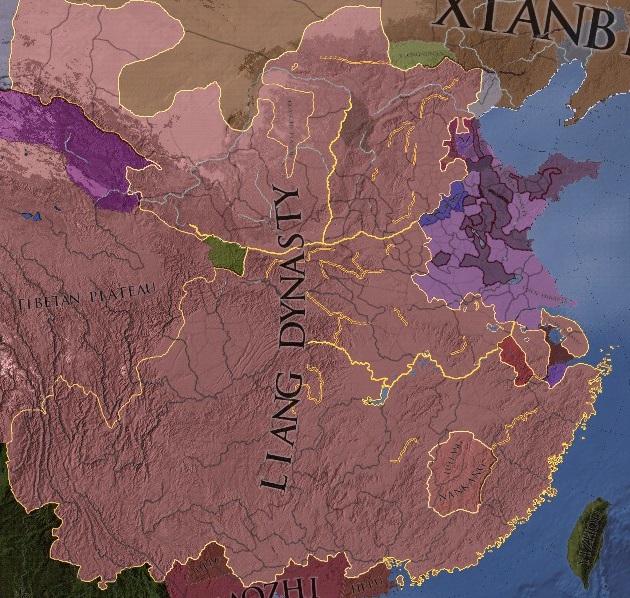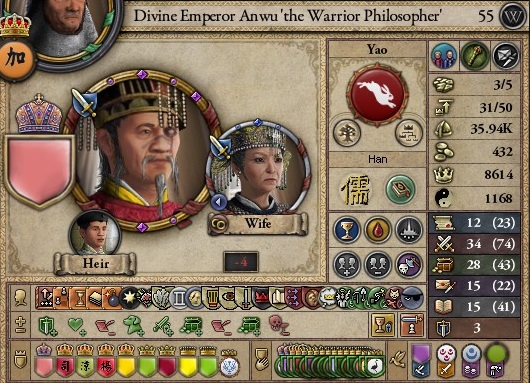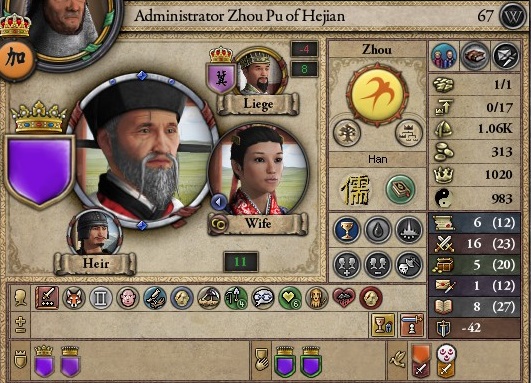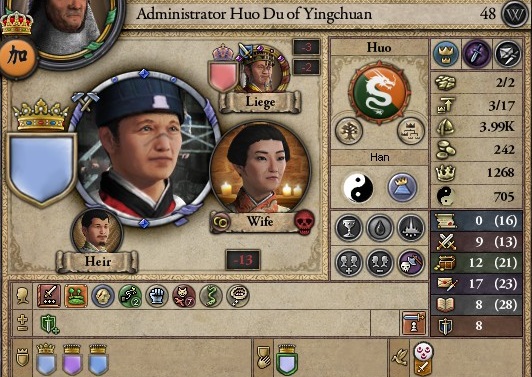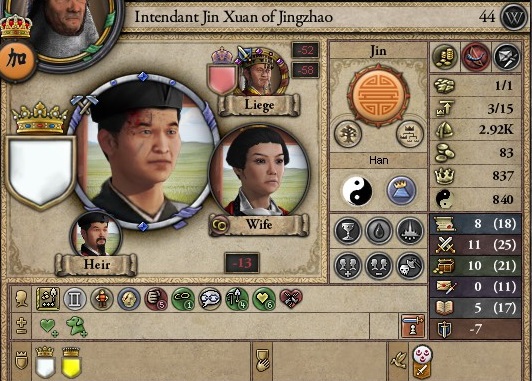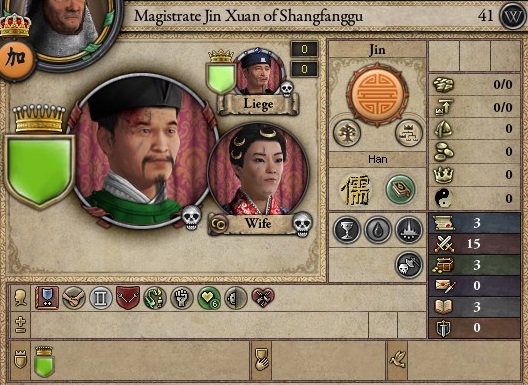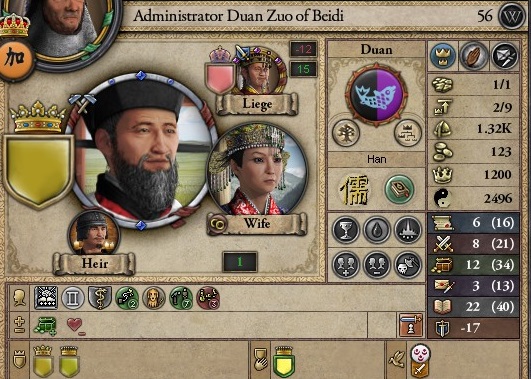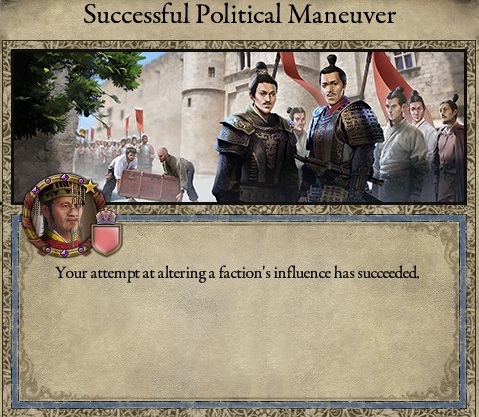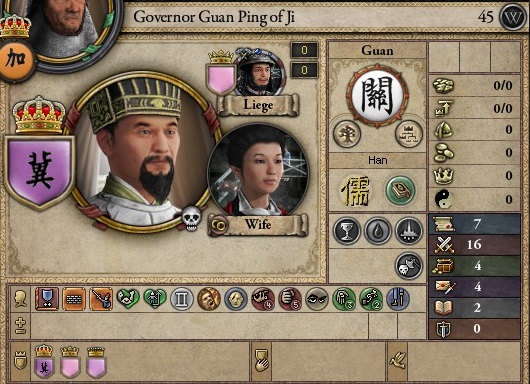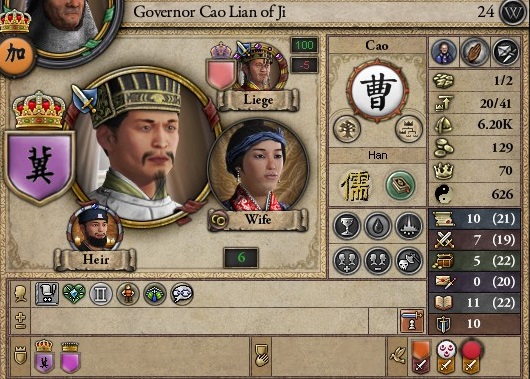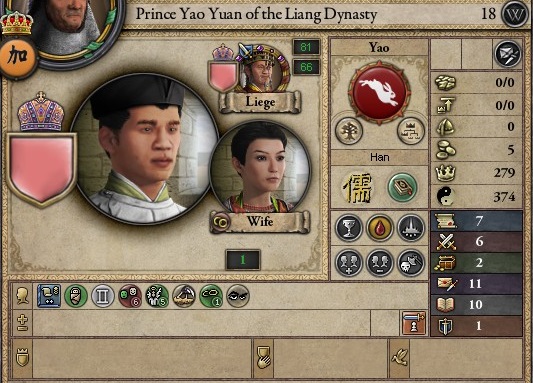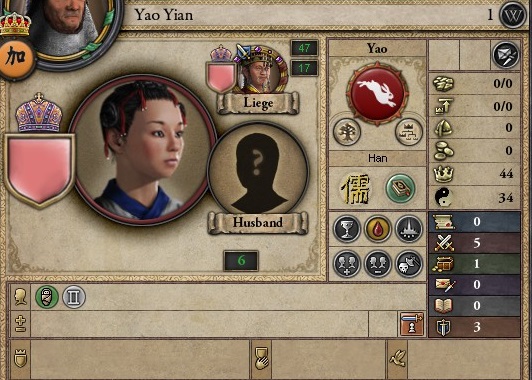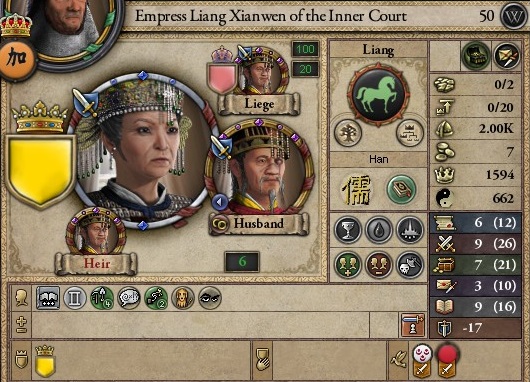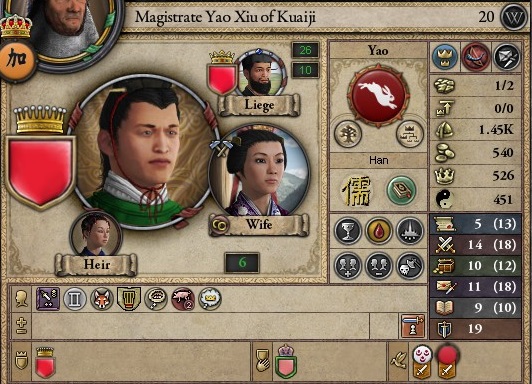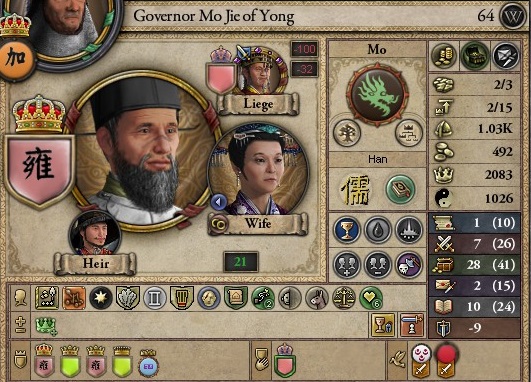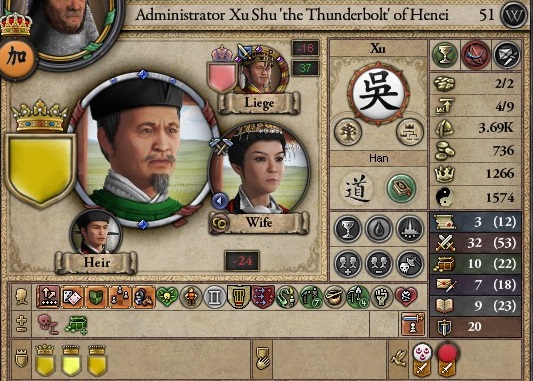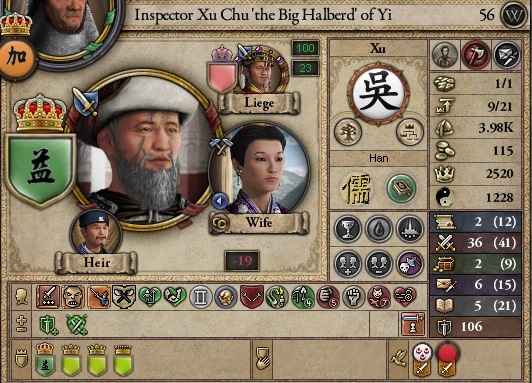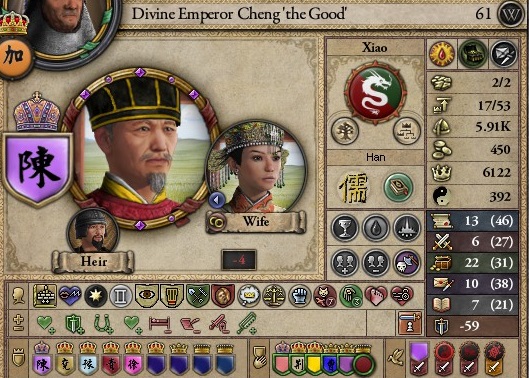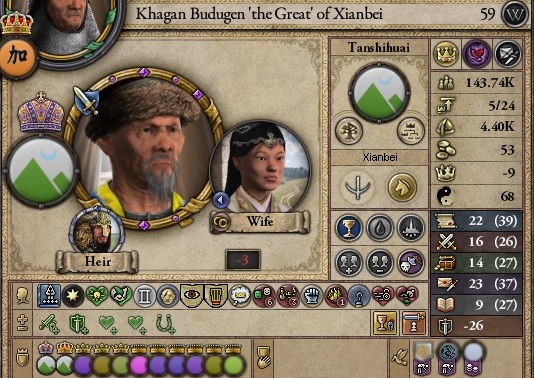222-223: UNCOMPROMISING PRIDE
Tan Shenquan, along with two of the Chen Dynasty’s greatest generals, had now rebelled with an intent to break away and reform an independent Qing Province. News of this revolt only made
Emperor Cheng curse his previous willingness to settle the issue diplomatically. He should have crushed that brat and have his whole family executed. Same with that no good former rebel Ma Chao! But what shocked him the most was the betrayal of Dian Wei. He had showed nothing but respect to Dian Wei, always giving him key commands and important offices throughout his career. He was one of the Emperor’s most prized subordinates. Yet here he was, rebelling against his rightful master. When some officials dared suggest that the Emperor’s tendency to fire his officials for no reason might have caused Dian Wei to rebel, Emperor Cheng had the officials flogged. They died from their punishment.
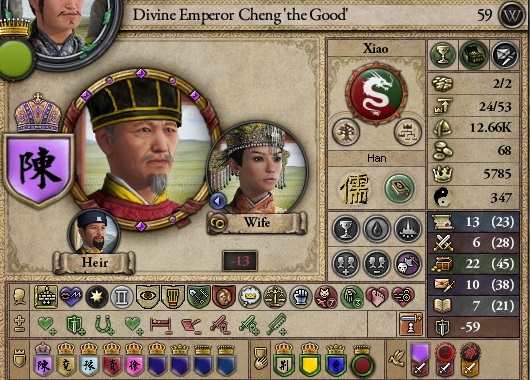
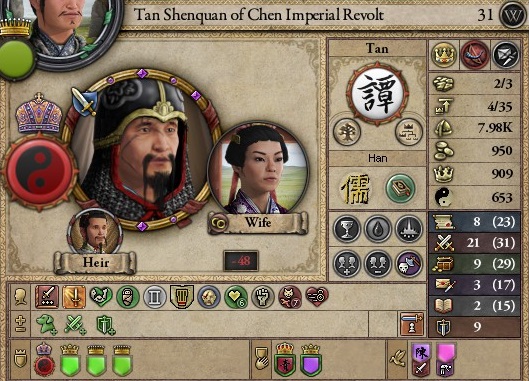
But even with a civil war on his hands, Emperor Cheng took the strange decision of ordering the campaign against Bohai to continue. If they could do damage to the rebels while there, then all the better. But the focus, at least for now, would be Bohai Commandery. This confused Chen Tiao, who argued that they should focus on the war with Tan Shenquan first, as it was a far bigger threat to the dynasty. But the Emperor was adamant. He still remembered how the wars with Xu Province had stopped him from annexing Dong Commandery all those years ago, thus allowing it to fall in Cao Cao’s grasp. Now the stakes were far greater with the Liang Dynasty on their borders. If they didn’t take advantage of Bohai’s weakness, then Emperor Anwu would. The Grand Commandant of the Imperial Army would spend the following months skillfully arguing the value of focusing on the civil war, eventually achieving his goal. But for now, he could only relay the orders of the Emperor, as a loyal subject would.
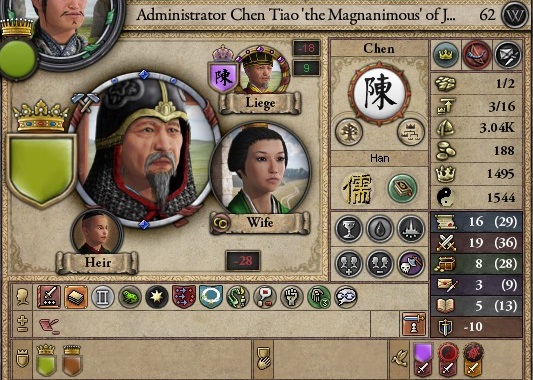
Still, some fighting between the Chen troops and the rebels took place, though this was mostly due to the loyalists crossing path with their enemies as they moved north toward Bohai. The first took place as
Hu Zan was ordered to go lead five thousand troops toward Bohai to help accelerate the conquest of the commandery. Hu Zan was just as baffled as Chen Tiao that the troops were not focused against Tan Shenquan and the rebels. What was the Emperor thinking? Knowing that he was on the out with Emperor Cheng, he instead tried to influence things by writing a letter to Crown Prince Tung where he detailed his complains about the current strategy. In the meantime, Hu Zan decided that his army had to “take a shortcut” while going to Bohai. This just happened to led them right into a rebel army. Poor Hu Zan thus had no choice but to fight the rebels. This proved a light engagement, with the rebels fleeing as soon as they started to amass losses.
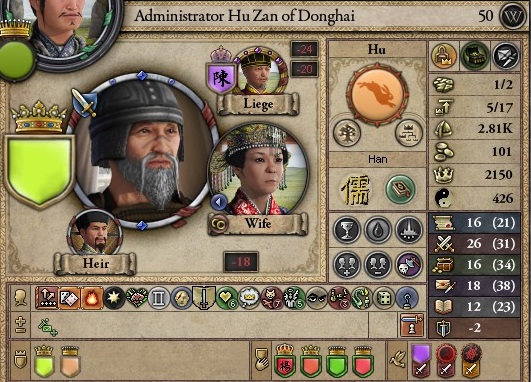

A similar scenario happened with Ding Zhiguo, though in this case the number of troops were reversed. Ding Zhiguo found himself at the mercy of the main rebel army, led by his nephew himself. Ding Zhiguo, once he realized that enemy scouts had noticed his army, tried to open dialogues with his nephew, hoping that he would be willing to let him pass. But Tan Shenquan offered his uncle an ultimatum: switch side of be defeated. Having recently gone through the effort of cementing his loyalty to the new dynasty by securing himself a marriage to Emperor Cheng’s daughter, Ding Zhiguo could not switch side in good conscience.
In the end, only one of the Chen officers managed to escape: Chen Gongwei. The promising young man had been promoted to Administrator of Xiapi Commandery and general to fill the vacancies left by the rebels. His was able to escape with a small part of the troops. As for Ding Zhiguo, he was captured by his nephew. Tan Shenquan once again offered his uncle to switch side, and once again he declined. While Tan Shenquan was furious, he still insisted that his uncle be handled with the upmost respect. Some soldiers wanted him executed, but their leader refused to harm his relative, even if he was not of the Tan Clan. A commendable act that would ensure that Ding Zhiguo survived this conflict.
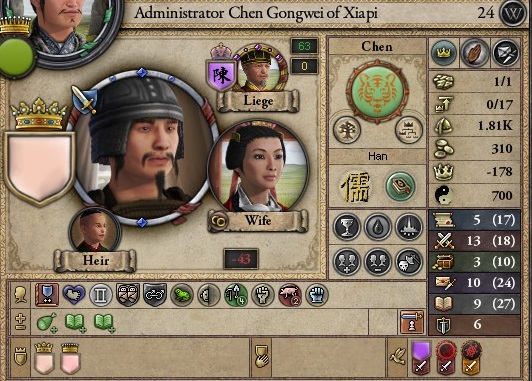
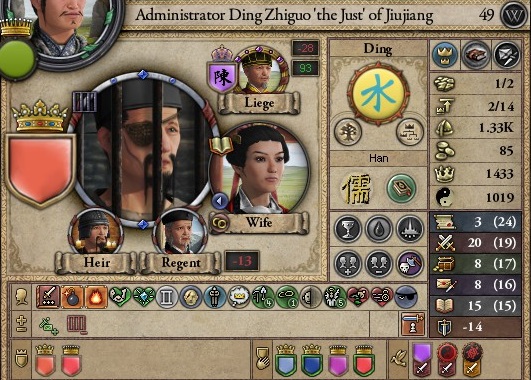
News of this reached the various armies thanks to the escape of Chen Gongwei. This made things especially awkward for Ba Daiping, as he was currently leading the campaign against Bohai Commandery. Having previously been a follower of Tan Shenquan, his status as one of the great generals of Chen was now put into question, especially his insistence on obeying the Emperor’s war plans. Was he trying to help his former liege by keeping the Chen army occupied? Was he secretly a traitor? But in truth, he was just too stubborn to abandon a winnable campaign, being convinced that they could easily take Bohai Commandery and then turn around in time to stop Tan Shenquan.
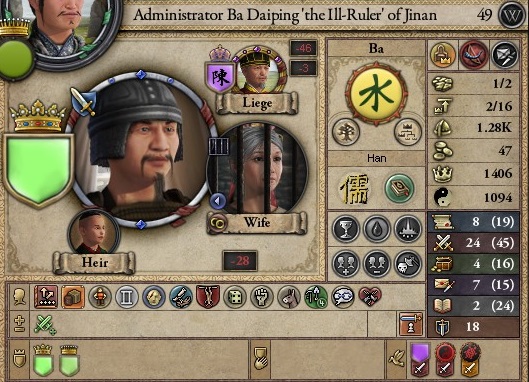
With Ma Chao and Dian Wei having fled to join the revolt, new officers had to be appointed to serve with Ba Daiping in Bohai. He found himself with an older man and a far younger subordinate. The first was the former Administrator of Dong Commandery, Ban Qiao, who had temporarily seized it from 210 and 211. He had since grudgingly joined Emperor Cheng and now served as an experienced general, if not an amazing one. The second officer was the competent Liu Derun, formally the Prince of Rencheng. He had been the first member of the Liu Clan to surrender his titles out of loyalty for the soon to be Emperor Cheng and was now rewarded for this by being given a small command to make his proofs. He would impress Ba Daiping with his versatility, proving to be the start of a long and successful career.
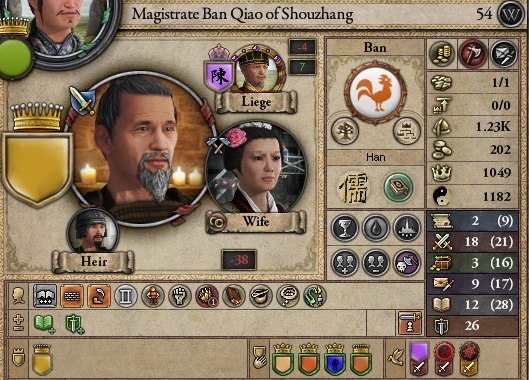
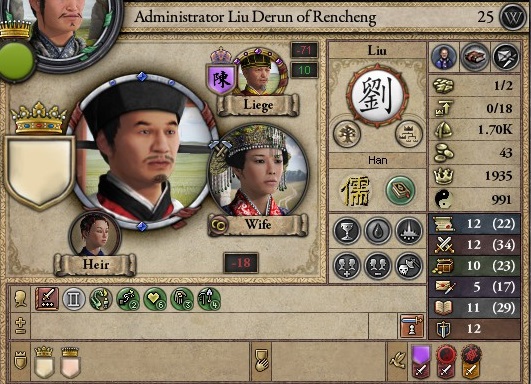
Ba Daiping proved quite successful in Bohai. He was able to handle the army of both sides with ease. At first, he challenged the forces loyal to the regency of Yuan Rei, but they were reticent to engage the Chen army. Undeterred, Ba Daiping simply forced them to battle, which they easily lost. He was then reinforced by 300 new troops to ensure that victory would be theirs. Ban Qiao then suggested that they move against the commandery’s headquarters, which was just fine with Ba Daiping. The regents were able to muster a small force to try and stop them and block their path. But if they had failed to stop the Chen Imperial Army before it received reinforcements, then their hoped of victories were close to none. Ba Daiping had fun crushing this pathetic attempt at an army, with the entire Bohai force being killed on the field of battle (including the commander). By July, they were making their way toward Yuan Rei at a rapid pace, with Hu Zan soon to arrive to reinforce them.

But while they were in their camps, the forces of Ba Daiping were attacked by rebels in the middle of the night. Not even the rebels of Yuan Shang, no. Tan Shenquan’s rebels. The attack was led by Ma Chao and a small force of volunteers, with the goal of killing the Chen generals in the middle of the night. No one saw this attack coming or was able to prepare for it. Ban Qiao was the first victim of this assault, the rebels quickly finding his tent and killing him as he was waking up. They failed to find Liu Derun, but they did identify the tent of Ba Daiping. They would have attempted to kill him too had Hu Zan not made a timely arrival that convinced the rebels to flee. When corpse of Ban Qiao was found, Ba Daiping was furious. Hu Zan used this opportunity to make a suggestion. Damn the orders from Chenguo, and damn Bohai Commandery. They needed to defeat Tan Shenquan, or at least bring an end to this civil war. HBa Daiping, after a few days of convincing, agreed. By early July, they assembled their troops and prepared to march south.
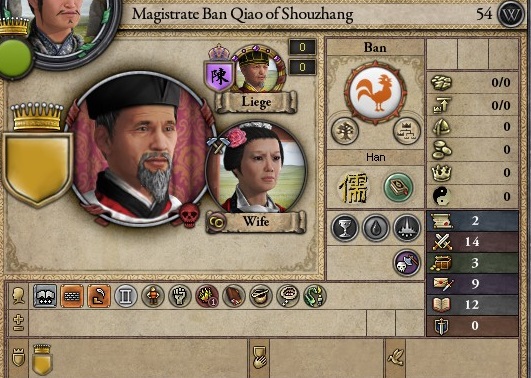
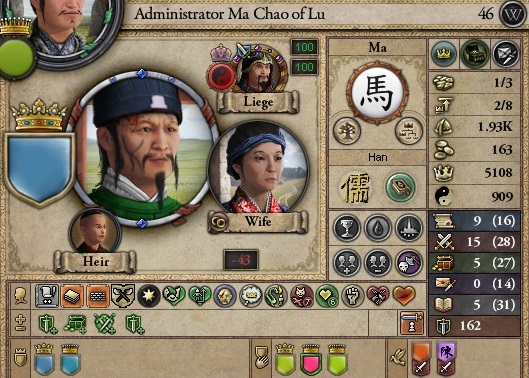
Of course, news of this blatant disobedience did not sit well with Emperor Cheng. At the time, the Grand Commandant had, after numerous painful attempts to change the Emperor’s mind, succeeded in convincing him of that the civil war needed to be their priority. Chen Tiao’s task had been made even more difficult by the efforts of the new Excellency of the Masses, Ren Duo. Among its duties, the Excellency of the masses was supposed the handle court when the Emperor was absent or unavailable (though the important affairs of the state were still handled by the Chancellor in that situation). With Emperor Cheng often struck by his gout problem, this left Ren Duo to organize the daily court while ensuring that direct access to the Emperor be restrained. Emperor Cheng actually enjoyed this, making him feel more important and exclusive due to the difficulties to talk with him. Thankfully, the Chancellor Ding Gongsi handled written reports from the officials and the provinces. And unlike Ren Duo, he did not distrust the generals and made sure that their complains and advices reached the Emperor. Thanks to this, Chen Tiao was eventually able to convince his liege that the revolt had to be crushed.
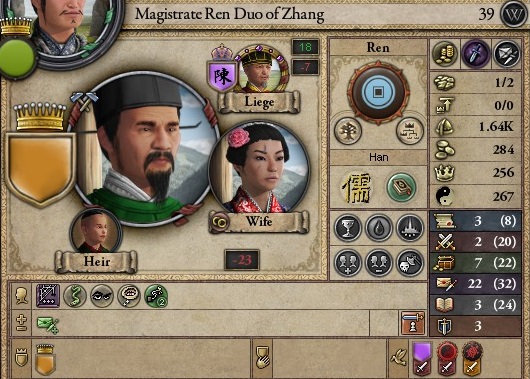
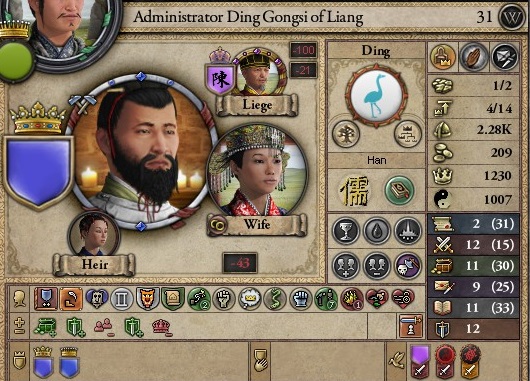
But the fact that the generals disobeyed orders just as the Emperor was agreeing with them only made the Emperor convinced of his own ways. He especially became convinced that his generals didn’t know what they were doing, and that only HE could save his dynasty from Tan Shenquan. So he started meddling with military affairs once again. This was shown in the appointment of a new Imperial Councilor to replace the captured general Ding Zhiguo. After months of refusing to pick a replacement, Emperor Cheng eventually settled on an old Liu Clansman named Liu Xi, who served as Administrator of Langye Commandery. Liu Xi didn’t like the Emperor, but he saw this as the best way to rise in the bureaucracy. And once he was close to Emperor Cheng, he started warning him against giving too much power to the generals. After all, wasn’t this what killed the Han?
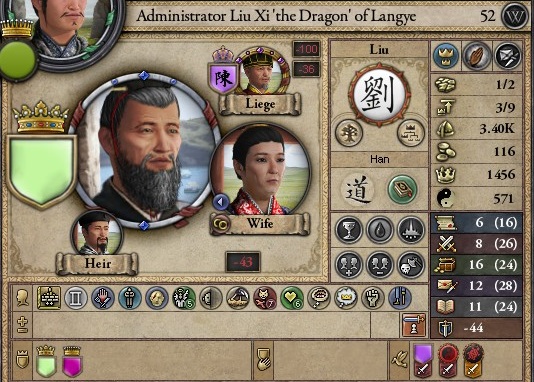
But complains kept mounting. The generals were sending requests to be allowed to do their job and end the civil war. Hu Zan also kept a correspondence with Crown Prince Tung, in which he told the prince “
If his Imperial Majesty refuses to let us wage a war the right way, then it would be wise for him to pursue the wisdom of peace and conciliation.” But the generals weren’t the only one complaining about the Chen Emperor and his court. Many officials within the Imperial Capital found themselves denied access to the Emperor, with Ren Duo seeing the advantages of limiting access to the Son of Heaven as much as possible. This made the Excellency of the Masses a hated figure among the courtiers, who saw him as a no-good snake with little political tact. Meanwhile, the Chancellor found himself submerged with reports demanding more funds or complaining about the new harsher laws of the Chen Dynasty.
In this chaos, news arrived that the Imperial army of Ba Daiping and Hu Zan had finally engaged the rebel forces of Tan Shenquan in January 223. The rebels had already conquered a few cities by the time the Chen army arrived. Tan Shenquan wanted to avoid such battle, as the Chen army was twice as large as his own rebel force. However, Hu Zan sent letters to the rebel camps and ordered his troops to shout insults at them. Dian Wei and Ma Chao were quick to insist that these insults be answered with swords, and Tan Shenquan eventually agreed. Ba Daiping and Hu Zan then led a skillful attack against the rebels, ensuring a great victory. At the request of Ba Daiping, a demand of surrender was then delivered to the rebels. Surprisingly, Tan Shenquan responded that he was willing to reach a compromise, though it is unclear how honest he really was. This offer of negotiation was sent to Chenguo with news of the victory. But instead of praises, Emperor Cheng criticized his generals for failing to capture Tan Shenquan and winning the civil war.

And this is when Yi Shing entered the picture, a young man with great ambitions. He had been appointed administrator of Donglai Commandery a year after the founding of the dynasty at the age of 17. His talent and ambitions had been noticed by the Emperor, who after multiple recommendations promoted him to his current post. Yi Shing was also delusional about his own self-importance, to the point of lunacy. And now he went to the Imperial Capital in order to singlehandedly bring an end to this conflict. He believed that a compromise should and could be reached with Tan Shenquan, one that would satisfy both side while ending the bloodshed. Emperor Cheng should simply appoint Tan Shenquan Governor of Qing Prince. The general stayed loyal while getting back the province he sought. Problem solved!
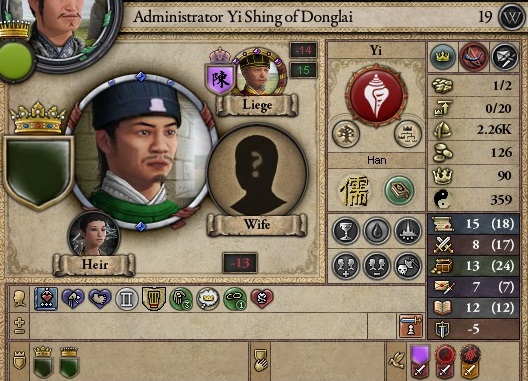
But the issue was the Yi Shing was unable to present this idea to the Emperor. When he wrote to the Chancellor from his commandery in late 222, Ding Gongsi dismissed the idea out of hand, never allowing it to reach the Emperor. He knew full well that Emperor Cheng would never agree, so why hurt his career by suggesting it? When Yi Shing showed up to court to meet the Emperor (convinced that he would be allowed to meet him), Ren Duo ensured that this young nutjob never got anywhere close to the Emperor’s palace. But Yi Shing wasn’t going to surrender like that. If he couldn’t gain access to the Emperor, he knew that the princes could.
He first tried to approach Prince Hanhe, who served as an advisor to his father and thus was probably the one with the most influence on the government (at least that’s how it looked from the outside). But Xiao Hanhe, as scared of his father as always, refused to even consider the idea, though he did direct Yi Shing toward the Crown Prince. Xiao Hanhe knew that Xiao Tung might have the guts to oppose their father, a foolish move that he did not understand. Access to the Crown Prince’s palace proved a lot easier, as Xiao Tung was always happy to receive others and hear news about the war. Yi Shing was quick to present him with foolproof plan to end the civil war. While Xiao Tung humbly admitted that he didn’t understand all the details, he did agree that the war needed to end. He had also been receiving reports from his friends and allies, all telling him that something had to be done. Not only did Xiao Tung agree to bring this up to the Emperor, but he wanted Yi Shing to accompany him.
_______________________________________________________
Xiao Bin was waiting as the guards opened him access to the Emperor’s palace. He took this moment to sigh at the reason of his presence. Grand Commandant Chen Tiao had asked him to come to the Imperial Capital to try and alleviate the Emperor’s fears about the generals. His younger brother Xiao Cang had first been asked, but the relationship between Cang and their father had turned for the worst recently. Rumors had it that Xiao Cang was starting to lose it, or maybe he was just getting too bold for his own good. He started criticizing his father’s policies openly, even though he refused to leave to go fight on the frontline. In the end, Xiao Cang refused to leave for Chenguo, and their father would probably not have seen him anyway. So Xiao Bin was the one who had to go.
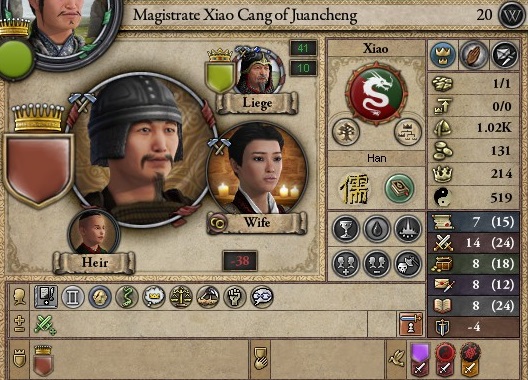
While he knew that he could easily achieve this goal, Xiao Bin still felt that he was no the right man for the job. After all, he somewhat agreed with his father. The generals needed to be subordinated to the court and restrained in their actions. His personal experience with the general Hu Zan had only convinced him that these men of strong personalities needed to be kept on a tight leash. If anything, his esteemed father’s main fault had been his unwillingness to allow a stable government. If he had kept his advisors on for a longer period of times, then discontent could have surely been avoided.
Finally, the guards allowed him in. He knew the way toward the Imperial bedchamber, where his father now received most of his guests. Getting out of bed was becoming difficult for the monarch due to his gout, so most of his private audiences took place with the Emperor in bed. As he approached the waiting room, two servants bared the path forward. Protocol, as always. You couldn’t barge into the Emperor’s bedroom without authorization, even if you were a prince.
“Tell his Imperial Majesty that I have arrived.” Xiao Bin told one of the servants with a bored voice.
“Right away, your Highness.”
The servant quickly moved out as he performed a bow to the prince, who simply paced around the room in wait. After twenty minutes, Xiao Bin came to the conclusion that his esteemed father must be in the middle of another important meeting. While his father liked to make others wait, he did not delay any important business if he could. Whatever criticism you could lay at his father’s feet, being lazy wasn’t one of them.
“Bin?” said a voice behind him.
He turned around to notice his half-brother Xiao Hanhe, who had just entered the room. Hanhe was slightly taller than him, though just as badly dressed (according to others, as Xiao Bin didn’t see the problem). His clothes were badly prepared, with some falling to his shoulder. He seemed a bit surprised to see his brother, though it wasn’t clear if he was happy or not. Their relationship wasn’t exactly great. Not only did Hanhe not share the same mother as the other Xiao brothers, but he was something of a bore. For someone who valued himself so much, Xiao Bin always found his older brother dull at best.
“Hanhe.” he responded, staying as neutral as always.
“I see that you are here to see father too…”
The way Xiao Hanhe avoided his gaze made Xiao Bin nervous. Was he uncomfortable in his presence? If that was the case, then this was a new development. More likely, he didn’t like being close to their father’s room. He had been like this since… well, since mother was strangled in front of them ten years ago. Which is strange, considering that she wasn’t Hanhe’s mother. Of all of them, he would have expected the second son to be the least affected. Yet it seemed that it was instead Bin and Dang that came out of this with a shrug, and only Bin seemed to have understood the lesson.
“Too? Are you supposed to have an audience with the Emperor?” Xiao Bin asked.
“M-me? No, no! I am just going to drop… hum… this report for him! No need to meet.” he said, as if trying to excuse his behaviour.
Sure enough, Xiao Hanhe produced a scroll and handed it to one of the servants, who humbly brought it in the Imperial Chamber. The two brothers then waited in awkward silence. Xiao Bin had questions, but he was not really interested in making conversation with Hanhe, a sentiment that seemed shared by his older brother. In this complete silence, Xiao Bin noticed that faint voices could be heard from the Imperial bedchamber.
“His Imperial Majesty is in the middle of an audience, I see.” Xiao Bin commented.
“Our esteemed Crown Prince is debating the war with him, as he is well versed in these affairs.” Xiao Hanhe answered.
While most would have missed it, it was clearly a jab at Xiao Tung. It wasn’t hard to guess that Hanhe was jealous of their older brother’s status as the heir. Xiao Bin couldn’t really blame him, as he understood the feeling far too well. He personally felt that he would probably be the more apt for the role of Crown Prince. But unlike Hanhe, he also supported Xiao Tung. The two had always been close since their young age, with Tung trying to act as a protective older brother even though he proved Bin’s inferior in most affairs. Xiao Tung was the Crown Prince, a place he had earned by being born first. And if Bin couldn’t be Emperor, then he would ensure that Tung was a great one.
But shouting started to come from the imperial bedchamber, distracting the prince from his thoughts.
“Such compromise could end the war!”
“T-T-TRAITORS! ALL O-OF THEM!”
“But father!”
“G-GET OUT!”
Moments later, two men emerged into the waiting room. The first he didn’t know, a young man who darted out of the room as soon as he appeared. But the other he easily recognized. His clothes alone made it clear that he was the Crown Prince. For all his humility, Xiao Tung always dressed appropriately to his station. As he entered the room, he was grasping his beard, a look of frustration on his face. He clearly lightened up once he saw his younger brother, though, and quickly darted to Xiao Bin.
“Bin! It has been a while!” he shouted as he grabbed his brother by the shoulders. This always took Bin by surprise.
“I salute the Crown Prince.” Xiao Bin said once he had regained his composure.
“None of that between us Bin.” the Crown Prince said with a wide smile on his face.
“How was your trip? I hope the rebels didn’t cause you problem.”
“There was no incident. In any case, the Grand Commandant provided me with an escort.”
“Good, good. Chen Tiao proved competent as always.” Xiao Tung added.
“Oh, is your family present? Changle would be happy to host them in our palace.”
Xiao Bin smiled, but didn’t answer. His wife and children were present, but he knew that his wife Gongsun Shengqiong didn’t like the barbarian Crown Princess. He was doing his best to avoid the subject as to not offend his brother.
Thankfully, Xiao Tung’s attention shifted to their brother, who was still in the room. Xiao Tung immediately felt embarrassed at this mishap. Unlike Hanhe or Bin, the Crown Prince made no efforts to hide his embarrassment or his lowering excitement.
“Hanhe… I see you are here too.” Xiao Tung said awkwardly.
“Brother.” Hanhe said, trying to avoid being too formal while not being too familiar.
“I see you too want to speak with our imperial father.” Xiao Tung said.
“No, actually I just came to…”
“His Imperial Majesty will now see the two princes.” said a servant, cutting off Xiao Hanhe.
“No, as I was saying…”
“The Emperor said both princes.” the servant repeated in an apologetic manner.
Xiao Hanhe’s face did not change much, but the weakening of his posture made it clear that he was abandoning any hope of protesting. Xiao Bin simply hoped that he could get on with his own affairs without being hindered by his brother’s presence.
“Bin,” Xiao Tung started,
“please try to convince father to negotiate. I am told that this war needs to end, but he is being too proud to admit it.”
Xiao Bin didn’t want to, but if his brother was asking then he would at least try. After offering a nod of confirmation, Xiao Bin and Xiao Tung were led into the imperial bedchamber. The room was a lot less impressive that one might expect, especially the lack of jade, gold or jewels. When asked about this, Emperor Cheng had explained that while he wanted to project his imperial authority, the coffers of the state needed to be used on useful projects instead of frivolous decorations. The only thing that was clearly of the highest calibers was his bed, which had been handcrafted and fitted with the most comfortable mattress. And of course, the color yellow was present on the walls and the bed, as it was the color associated with imperial power.
While he was still in bed, the Emperor of the Cheng Dynasty was in a seated position, his back relaxing on various cushions. He was a in his full imperial costume, which strangely didn’t look out of place in this high-class bed. Even in this situation, their fathers. He waved his sons to approach, trying as always to get through life with as few words as possible to hide his stutter. The two sons advanced and fell to their knees, saluting the Son of Heaven as he was owed.
“We thank his Imperial Majesty for according us this audience.” They both said in unison.
“Respect.” Emperor Cheng nodded approvingly.
“T-Tung should learn f-f-from you t-two.”
The brothers looked at each other with worries. If he was stuttering that much, then he was probably in a foul mood.
“If the Crown Prince offended his Imperial Majesty,” Xiao Bin started to explain,
“then it must have been a misunderstanding, after all…”
Xiao Bin had more to say in his older brother’s defense, but Xiao Hanhe stopped him with his hand before shacking his head. Clearly the second son didn’t want them to antagonize their father.
“Tung, that b-brat!” the Emperor fumed.
“Wants to g-g-give t-those traitors w-what they w-want! HE D-DOESN’T UND-DERS-S-S-… He misses the p-point!”
Neither brother was certain how to react, so they wisely allowed their father to continue his rant.
“T-Tung is n-naïve! He doesn’t g-get the b-basis of rulershe-ship! How d-dare he speak to me li-like this? I have c-clearly m-made a mis-st-stake when making him C-Crown Prince!”
This caught Xiao Bin’s attention.
“What?”
“Bin. You are far b-better than Tung, or any of your b-brot-thers.” Emperor Cheng told him.
Xiao Bin couldn’t see his brother’s face, but he could guess that this must have hurt to just kneel there and take this in silence.
“Come closer.” their father ordered him.
Once he did, his father seemed to calm down, weighting his words and repeating them in his head to make sure that he got them right.
“You are smart. You are like me. You should be C-Crown Prince, not Tung.”
“But…”
“Don’t you want it?” asked the Emperor.
Xiao Bin was shocked at this proposal. The position of Crown Prince, the succession to the empire. He was offered his secret dream, just like that. The possibility to become Emperor, to continue the dynasty. And now his father was offering him to position? He really wanted to say yes… but he was also smart enough to see the problems it would cause. Xiao Tung was popular. Having him deposed as Crown Prince would certainly bring divisions that were unnecessary at this critical juncture. It would leave the Chen divided, and worst-case scenario might lead to a civil war for the throne. And more importantly, how could he ever face Xiao Tung against after seizing what was his? While he knew that he would make a great emperor, his older brother had to be the heir in order to preserve the unity of the Chen Dynasty.
His decision made, he bowed all the way to the ground and said:
“I beg his Imperial Majesty to reconsider! Please give Crown Prince Tung another chance!”
Clearly, this was not the answer his father had been hoping for. His expression grew darker and more severe.
“Out.” he simply whispered.
The two princes didn’t wait for him to repeat. They quickly exited the bedchamber. And Xiao Bin could only wonder if he had done the right thing.
_____________________________________
While Xiao Tung would remain the Crown Prince, this did nothing to solve the problem of the revolt. Emperor Cheng had refused any deal with the rebels, instead wishing to crush Tan Shenquan and see him dead. But Yi Shing didn’t feel deterred! Because now that the Emperor wouldn’t help, then he just had to turn to his backup plan. A genius backup plan! He left Chenguo as soon as his audience was over and reached the army camp of the Chen army to propose his crazy idea. It was simple, really. All they needed to do was to raise their own banner and destroy both the Imperial Army and the rebel, thus forcing them to accept the compromise and bringing peace, unity and friendship to the Chen Dynasty. This was a dubious plan that barely made any sense.
Except that people listened. Most officials and generals agreed that this war could be ended easily, including the officers who had just crushed Tan Shenquan seven weeks ago. Hu Zan, Ba Daiping and Liu Derun all agreed to join Yi Shing, with half of their troops also defecting to this new revolt (if it could be called that). But they weren’t alone. Ban Xuanling, the son of Ban Qiao, felt that his father died for a war that could have been avoided. Ying Hansheng, who had been unceremoniously removed because of his brother Ying Mo’s invasion, hoped to use this to get some influence back. And Sima Fu, Administrator of Taishan Commandery, simply wanted this war done before the Liang Dynasty tried to take advantage of the situation. Through his intransigeance and his prideful nature, Emperor Cheng now found himself with a far greater revolt on his hand, one that left him vulnerable and without his best generals.


